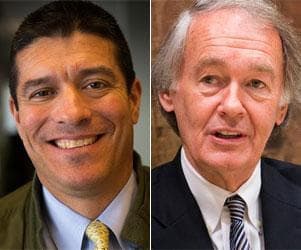Advertisement
Gaming Out The Markey-Gomez Contest
It didn't take long.
Just minutes after U.S. Rep. Edward Markey claimed victory in the Democratic U.S. Senate primary Tuesday night, he fired a shot across the bow of newly minted Republican nominee Gabriel Gomez.
"He's a typical Republican, and the first domino for the national GOP seeking to take control of the Senate and enact an extreme agenda that's bad for Massachusetts," Markey's campaign said in a statement.

Guns, Social Security, women's rights. The statement called out Gomez on all of it.
The message is a familiar one.
The general election script for New England Democrats running for the House or Senate is dog-eared by now: Tie your Republican opponents to a national GOP deeply unpopular in the Northeast.
It's a message that carries some real punch in these parts. See Warren, Elizabeth, circa 2012.
The most vital question in any local congressional race, then, is: What can the Republican do to shift the conversation?
The GOP's Scott Brown had two answers when he scored his upset victory over Democrat Martha Coakley in the 2010 U.S. Senate special election.
First, present a compelling personal narrative. Second, grab on to a game-changing issue — Obamacare, in his case — that can disrupt the Democratic narrative.
Gomez, a 47-year-old venture capitalist, has rolled out a pretty compelling personal narrative: son of Colombian immigrants, Harvard Business School degree, former Navy SEAL.
As for the game-changing issue? The Boston Marathon bombings are the obvious candidate.
The attacks were so shocking, and the media coverage so intense, that they smothered rather than defined the Democratic and Republican primaries.
But it seems likely that the dynamic will shift in the coming months. Indeed, the bombings story is already shifting from a human drama to a more political one, with questions about intelligence failures and the like increasingly prominent.
U.S. Rep. Stephen Lynch attacked Markey on homeland security in the closing days of the Democratic primary, to no avail. But Gomez's team could decide to pick up on that thread.
At least some GOP operatives relish the idea of a campaign defined by security concerns. "The story of the day is going to define the race," says Jennifer Nassour, former chairwoman of the Massachusetts Republican Party, "and the story of the day is terrorism in Boston."
But Peter Ubertaccio, a political scientist and director of the Martin Institute at Stonehill College, says making the bombings a centerpiece of a GOP campaign could look opportunistic.
And he's doubtful that the terrorism issue has the power to fundamentally alter the race. "It's not going to move voters," Ubertaccio said.
There is no evidence, moreover, that Gomez will make terrorism a major issue. The Republican's early messaging has focused on his personal story. He's said over and over again that he's the anti-politician. And that approach would lend itself to an indictment of Markey as entrenched insider.
Gomez hit the theme hard when he accepted the Republican nomination Tuesday night.
Markey is tired, he suggested, first elected to Congress when Gomez was playing Little League baseball and the rock group Boston put out its first album.
"Washington is full of politicians," Gomez said. "If you send another one down there, you'll get the same result."
The Republican, no doubt, will mine Markey's long voting record for evidence to support the argument that the Democrat is out of touch.
In the end, the bet is that the Markey critique and Gomez's own story will be enough to stir the independents and conservative Democrats he needs to pull off an upset.
But in a race that's only generated interest among party stalwarts so far, the question is: will that be enough?
Earlier WBUR Profiles:
This program aired on April 30, 2013. The audio for this program is not available.